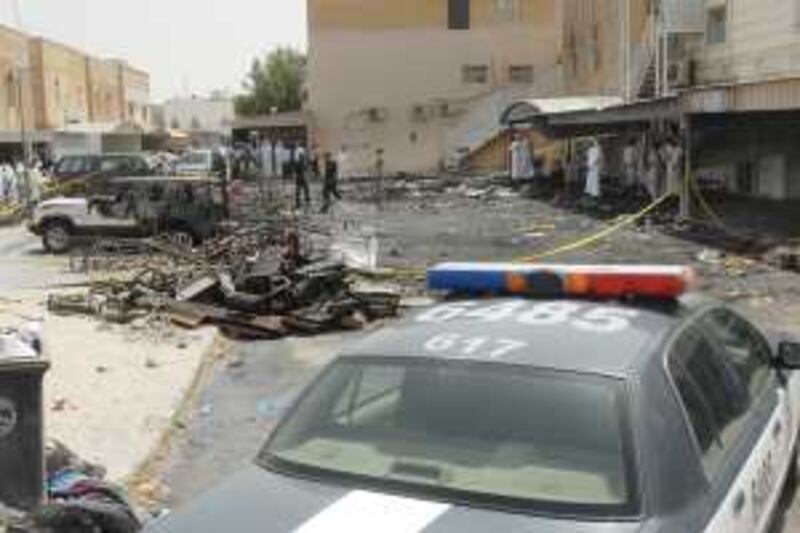All large tents erected for long periods such as Ramadan require inspection and approval by the authorities. But after the tragedy in Kuwait, officials are also advising that owners of smaller, private tents follow the safety guidelines. Hala Khalaf and Praveen Menon report The tent is integral to celebrations in the Emirates. It is where friends gather after a heavy Iftar meal and where families smoke fragrant shisha, snack on sweets and mark some of life's most important events.
A tent is also where at least 41 people were killed - and 76 others injured - in a fire at a Kuwaiti wedding. And as many families and businesses in the UAE prepare to set up tents for the holy month of Ramadan, some holding as many as 4,000 people, officials said safety regulations for the structures vary widely. Dubai Municipality said yesterday that the Kuwaiti tragedy would make authorities more cautious, especially with so many Ramadan tents going up in the city.
"This is a very unfortunate incident. It has definitely made authorities like the municipality and civil defence sit up and take more notice of safety and look into fire safety in tents," said Salem bin Mesmar, the assistant director general for health, safety and environment at the municipality. "We are waiting to know what exactly happened in the marriage tent in Kuwait. Only further investigation will show if the tent caught fire due to electric problems or food heating equipment used or some other problem."
All tents erected in Dubai for Ramadan require a permit from the buildings department at the municipality. "The tents are permitted only if all requirements, including public safety, are ensured," Mr Mesmar said. Mr Mesmar said the safety regulations included fire extinguishers at clear and visible locations in the tent, more than one exit and a clear passage in case of an evacuation. "The municipality always works in co-ordination with civil defence and all requirements need to be fulfilled. The buildings department will deny permission to construct tents if they see that the civil defence requirements are not met." He added that regular inspections would be conducted by the municipality at these tents all through the month of Ramadan.
Most tents are not fireproof, and extra caution needs to be taken to ensure they are safe, officials said. While five-star hotels have erected large, lavish tents in Dubai, smaller ones have also sprung up next to mosques, shopping malls and in open grounds. These tents require special permission to allow shisha and cooking. "Mostly four- and five-star hotels apply for permits to serve shisha," Mr Mesmar said. "Special permission is required to offer shisha in tents. Also, hot handling of food or heating of food requires permission from the municipality."
Last week, Dubai Municipality issued circulars to all establishments reminding them about the regulations in Ramadan tents and urging them to seek proper permission. "We already have a lot of people who approached us enquiring about the procedures," Mr Mesmar said. He urged families who set up private tents to follow safety guidelines, as officials will not be able to look into such small set-ups.
"As far as safety is concerned, it depends on every individual and not just the tent provider," said Clayton Pereria, the business development manager at 4 Seasons Entertainment & Events. "Companies that erect tents have to keep all possibilities in mind, and be aware of the fact that accidents can happen, but really, there is nothing we can do in private functions like weddings once a tent is put up."
Mr Pereria said individuals must take responsibility in cases where the Government was not committed to inspections. "For large public events, or for tents that will stay up for long periods, like Ramadan tents that are up for a month, the civil defence department in Dubai comes and inspects the tent for safety regulations, for clear exits and so on," he said. "But this is not the case for private tents put up for weddings, so the responsibility is left up to the individual and to the standards of the tent company."
Isam al Moswak, owner of Al Mohja Tents, which has offices in Dubai and Abu Dhabi, said people approached him for tents for all types of events."I have tents that can fit 50 people, or up to 1,000," said Mr al Moswak. He said his tents are usually made of waterproof and fireproof material, but that does not preclude fire outbreaks. "There are carpets inside, tablecloths, and napkins, and trappings made of satin or other inflammable materials; all of that can catch fire," he said. "If a cigarette touches the outside of the tent, which is fireproof, we're safe, but what happens if the cigarette falls on the carpet inside?"
Paul Berger, chief executive officer of Harlequin Marquees in Dubai, said wedding tents were a small percentage of the company's business - "only one or two a year," he said. "For structures that are up for a long period, over two to four weeks, the municipality in Dubai will always inspect the safety of that structure. If it is a small, private event somewhere, then I don't think they check so closely."
Ali Krunz, manager of the Abu Dhabi branch of Al Baddad Tents, one of the biggest tent rental companies in the region, with branches in Dubai, Sharjah, Abu Dhabi and Saudi Arabia, said the capital had more safety regulations in place than most people were aware of. "In Abu Dhabi, the Municipality, the civil defence and the Abu Dhabi Tourism Authority are all greatly concerned with the safety of tents," Mr Krunz said. "They demand that the interior of the tents and all the material used inside are sprayed with a fire-resistant chemical, and they check for fire extinguishers, smoke detectors, sprinklers and proper exits."
@Email:hkhalaf@thenational.ae pmenon@thenational.ae






